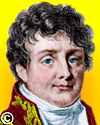 (source)
(source)
|
Baron Jean-Baptiste-Joseph Fourier
(21 Mar 1768 - 16 May 1830)
French mathematician, Egyptologist and administrator who made many contributions to mathematical physics, and is remembered for the Fourier series.
|
Glossary for article - Joseph Fourier - Biography: Politician & Scientist
Notes
The Popular Society in Auxerre: This was definitely a sans-cullotte (verging on Hébertist) society - before Fourier joined them a group of its activists had called for the trial (and by implication execution) of the King. The Hébertists were the Jacobin club to which Marat belonged.
Myxedema: Also known as hypothyroidism.
Gautherot: Amongst them was one of the leaders of the Auxerre Popular Society, Gautherot. A man known later as one of the artists in David`s atelier. There are only three pictures of Fourier in existence: one sketch by Bouilly; a sketch by Gautherot and a painting which has been credited to Gautherot.
Connections: He had the opportunity to meet Monge, Lagrange and Laplace.
Rosetta stone: This was when the famed Rosetta stone fell into British hands.
Napoleon's Abdication: After which Fourier had to negotiate terms with an occupying Austrian army.
Lyons: Where the Bourbons had their court.
L'Institut de France: In 1816, the Académie was still called the Institut de France: it changed shortly after Fourier`s royal rejection.
White Terror: By this date the "White Terror" which had followed Napoleon`s final exile, hounding anyone with radical or Jacobin tendencies, had died down, so that his entry was on merit.
Heat Loss: Each point along the bar receives heat from points preceding it and loses heat to those after it and to the surrounding air.
Réamur scale: In this scale 0 was the temperature of melting ice; 1 was the temperature of water boiling at a certain pressure and in a certain vessel.
Prize Judges: All of whom he knew: Malus and Haüy from Egypt; and the others from the École Polytechique. Malus was a member of Laplace`s influential Société d`Arcueil and Haüy was associated many of that society`s members. Laplace was in place to overrule any objections which Lagrange might put forward.
Judges' comment:
... cette pièce renferme les véritables équations différentielles de la transmission de la chaleur, soit à l`intérieur des corps, soit à leur surface: et la nouveauté du sujet, jointé à son importance, a déterminé la Classe à couronner cet Ouvrage, en observant cependant que la manière dont l`Auteur parvient à ses équations n`est pas exempte de difficultés, et que son analyse, pour les intégrer, laisse encore quelque chose à desirer, soit relativement à la généralité, soit mêmê du côté de la rigueur.
Definite Integrals: It was Fourier who first used the definite integral notation as we know it.
- Science Quotes by Baron Jean-Baptiste-Joseph Fourier.
- 21 Mar - short biography, births, deaths and events on date of Fourier's birth.
- Joseph Fourier - Biography: Politician & Scientist
- Joseph Fourier - eBibliography for Biography: Politician & Scientist






